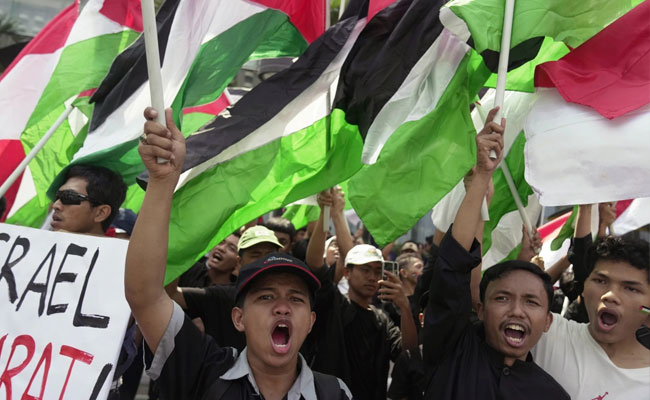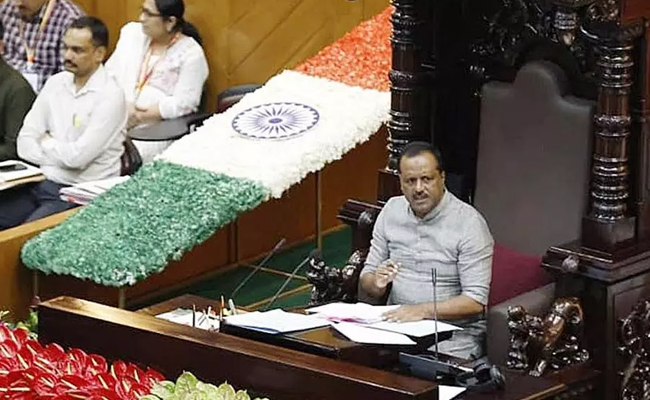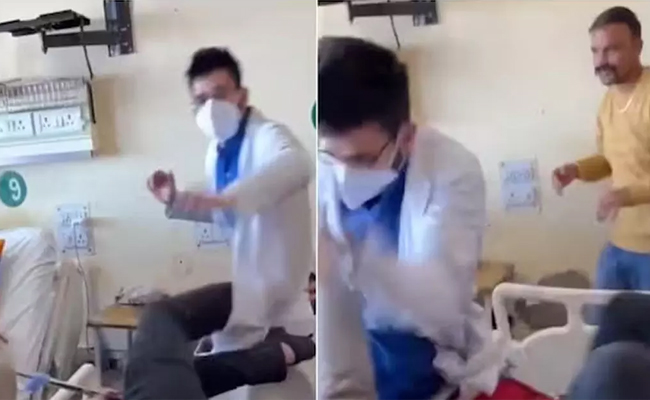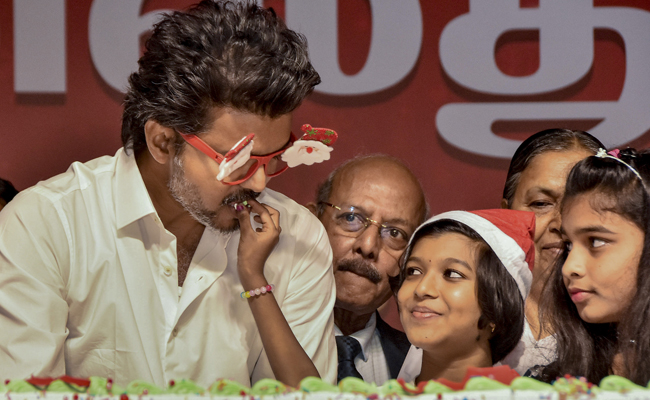Baghdad (AP): Protesters gathered at Iraq's border crossing with Jordan on Friday to show solidarity with Palestinians in the Gaza Strip and call for an end to Israel's blockade, while in Indonesia's capital, demonstrators marched from several mosques to the heavily guarded U.S. Embassy in Jakarta to denounce American support for Israel and demand an end to Israeli airstrikes.
Similar protests also took place in front of the United Nations mission, a few kilometers (miles) from the embassy, and in the compound of the Indonesian Ministry of Foreign Affairs. Authorities estimated that about 1,000 people participated in the rallies across Jakarta following Friday prayers in the world's most populous Muslim-majority nation.
A brutal incursion into southern Israel by Hamas fighters on Oct. 7 provoked Israel to declare war against the militant group that rules Gaza. The Israeli siege of the Palestinian territory and airstrikes on it were the focus earlier this week of demonstrations at Egyptian universities, inside a congressional office building in Washington, outside the Israeli Embassy in Bogota and near the U.S. Embassy in Beirut.
Nearly two weeks after the Hamas attack in Israel, such protests continued as Israel prepared for an expected ground invasion of Gaza.
The Gaza Health Ministry has said more than 4,000 people have been killed and over 13,000 have been wounded in Gaza since the war began, most of them women, children and older adults. More than 1,000 people were believed buried under rubble, authorities said.
More than 1,400 people in Israel have been killed, mostly civilians slain during Hamas' deadly incursion. Roughly 200 others were abducted. The Israeli military said Thursday it had notified the families of 203 captives.
IRAQ
Hundreds of Iraqi protesters gathered at the western Trebil border crossing near Jordan in a demonstration organized by the Coordination Framework, an alliance of Iran-backed Shia political groups and militias in Iraq.
The pro-Iran coalition also called for a protest in Baghdad near the main gate of the highly fortified international zone, where the U.S. Embassy is located, to condemn its endorsement of Israel in the ongoing war with Hamas.
Their rival, Iraq's firebrand Shia cleric Muqtada al-Sadr, the most influential in the country, issued a call Thursday for Arab nations bordering Israel, notably Lebanon, Syria, Egypt, and Jordan, to engage in what he called peaceful demonstrations at their borders.
The protesters waved Palestinian flags and chanted "No to Israel" before praying in the presence of religious clerics.
In recent days, Iran-backed militias attacked United States military bases in Iraq. Iran has warned that an Israeli ground incursion into Gaza could spark an escalation from allied armed groups and a possible regional war.
INDONESIA
Protesters who marched to the U.S. Embassy halted traffic along the way as they chanted "God is great," and "Save Palestinians."
Waving Indonesian and Palestinian flags and signs reading "We are proud to support Palestine," more than 100 noisy demonstrators gathered along a major street in Jakarta that runs outside the embassy.
Some protesters burned portraits of U.S. President Joe Biden and Israeli Prime Minister Benjamin Netanyahu.
About 1,000 police were deployed around the embassy, the nearby presidential palace and the U.N. mission.
Indonesia does not have formal diplomatic relations with Israel, and there is no Israeli embassy in the country. It has long been a strong supporter of the Palestinians.
President Joko Widodo strongly condemned a Tuesday night explosion at a Gaza City hospital filled with wounded Palestinians and residents seeking shelter. Widodo described it as an attack that violated international humanitarian law, although the cause of the blast at al-Ahli Hospital has not been determined.
U.S. assessments said the explosion was not caused by an Israeli airstrike, as the Hamas-run Health Ministry in Gaza initially reported. Israel has presented video, audio and other evidence it says proves the blast was caused by a rocket misfired by Palestinian militants, who denied responsibility.
The AP has not independently verified any of the claims or evidence released by the parties.
"Now is the time for the world to stand together to build global solidarity to resolve the Palestinian issue fairly," Widodo said in a televised statement from Saudi Arabia, where he was attending the ASEAN-Gulf Cooperation Council summit.
SOUTH KOREA
In South Korea's capital, dozens of protesters chanted slogans, waved Palestinian flags and raised anti-Israel banners.
"Free, Free Palestinians!" the protesters shouted, while holding banners that read "We stand with Gaza" and "Stop the massacre by Israel!"
"Please care about human lives. That's all I am thinking about," said Elshafei Mohamed, an Egyptian student in Seoul. "If we want to really help, we need to supply Gaza with humanitarian aid at once."
Let the Truth be known. If you read VB and like VB, please be a VB Supporter and Help us deliver the Truth to one and all.
Bengaluru (PTI): Bengaluru City Police (BCP) on Monday said that it has, in collaboration with cab aggregator platforms Uber and Ola, implemented a technology-driven integration aimed at enhancing the safety of riders and drivers.
It would also strengthen emergency response mechanisms across the city.
As part of this initiative, emergency call facilities have been incorporated within the Uber and Ola mobile applications used for booking rides, it said.
ALSO READ: Doctor assaults patient at Shimla hospital; probe ordered as video sparks protest
Through this integration, riders and drivers seeking emergency assistance can directly share real-time location data, trip details, and contact information with Bangalore City Police's 112 emergency response infrastructure from within the Uber/Ola app itself, an official release said.
Noting that this seamless flow of critical information enables quicker police access during emergencies, facilitating faster response times and potentially life-saving interventions by first responders, it said the initiative is a significant step towards leveraging technology partnerships to ensure safer urban mobility and improved public safety.





